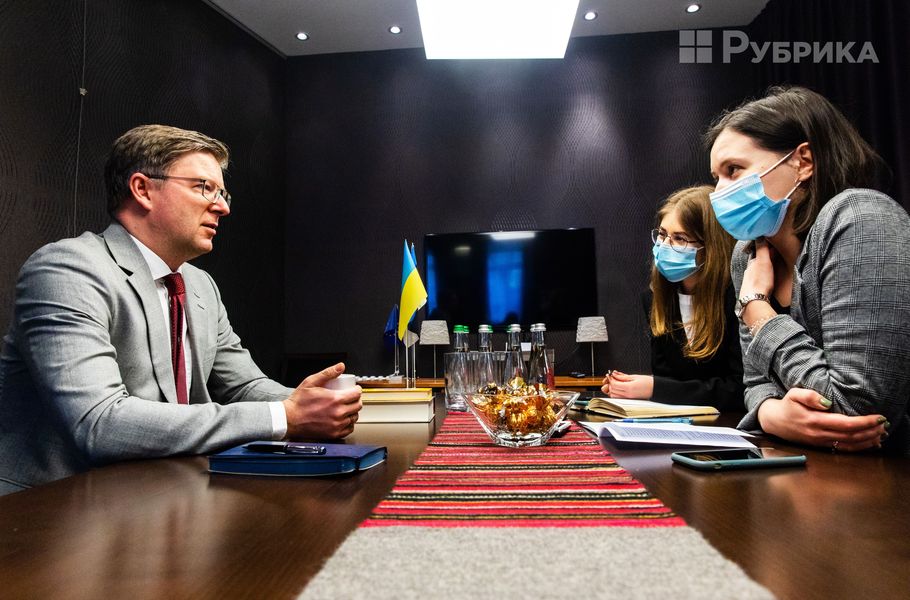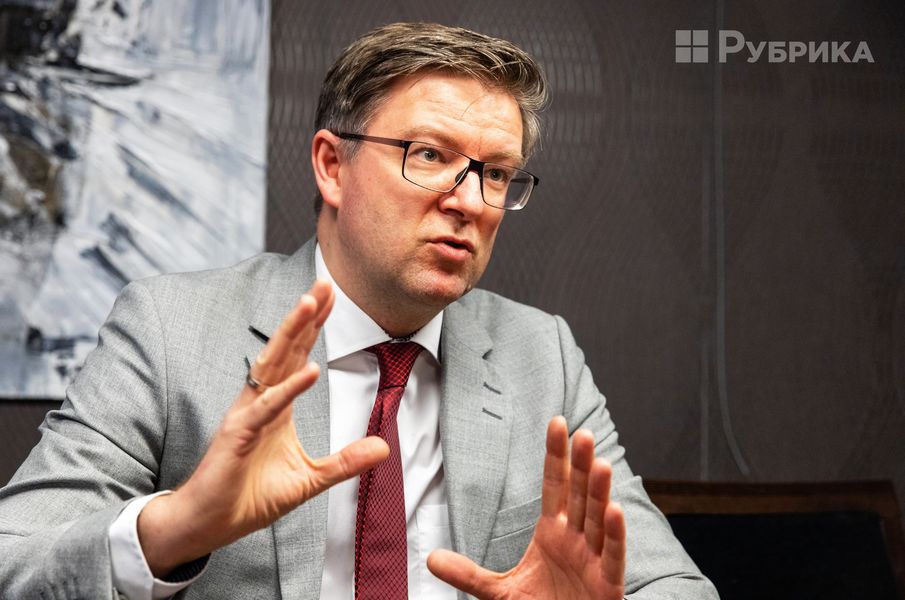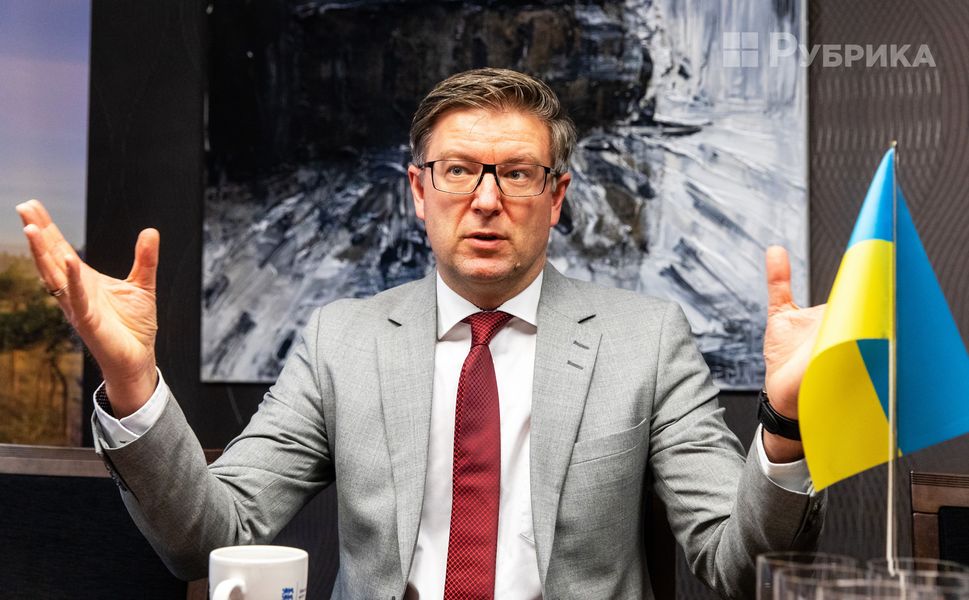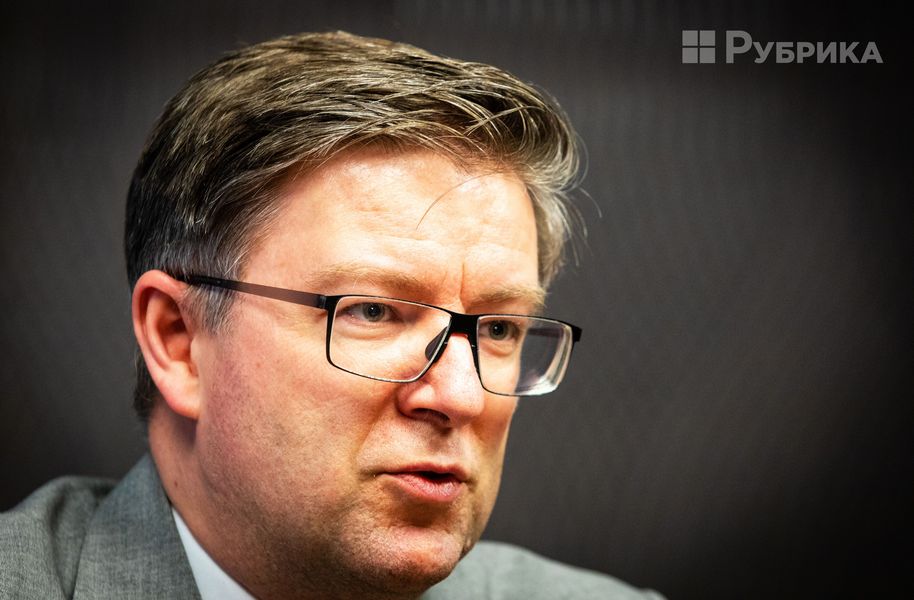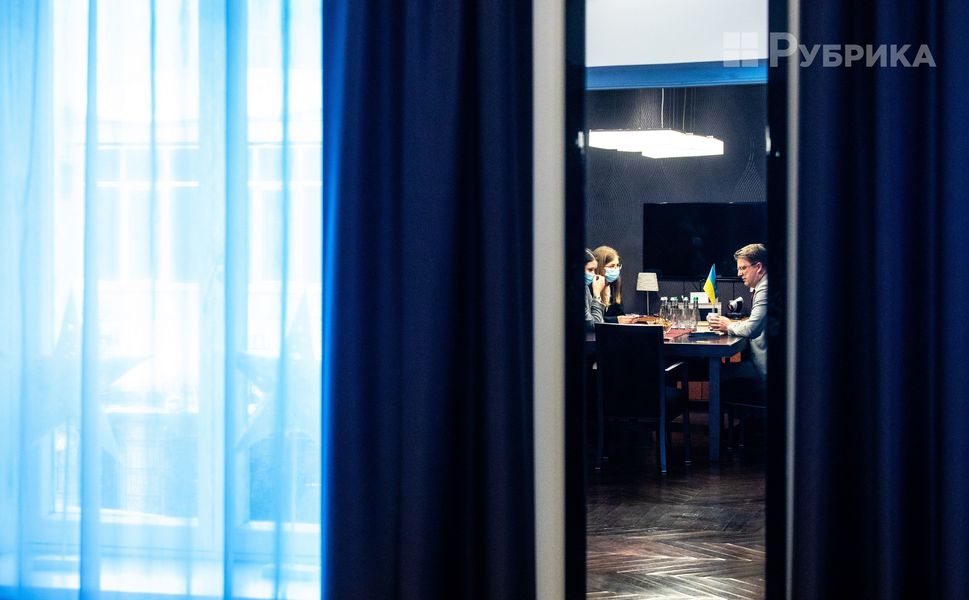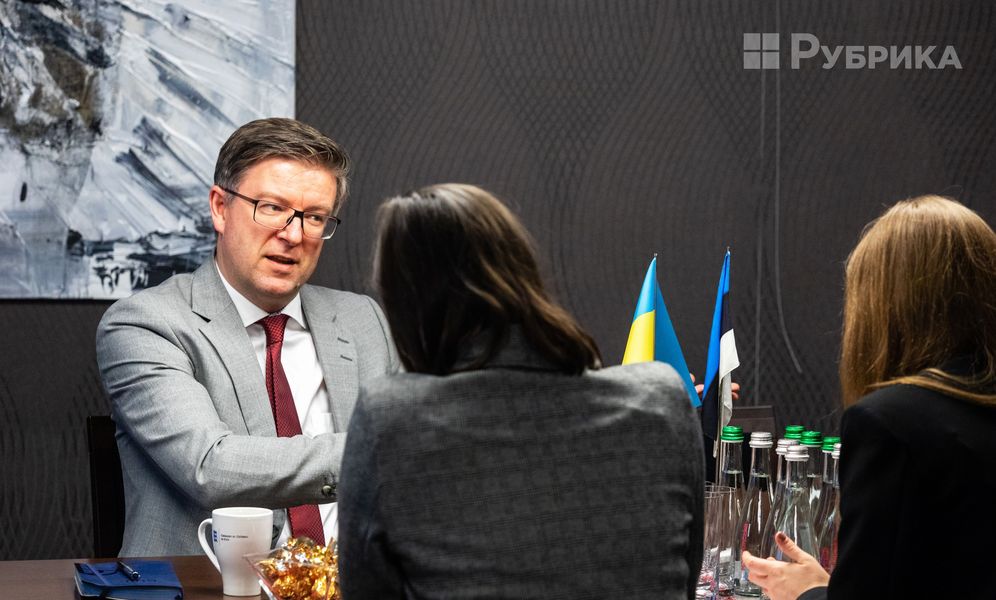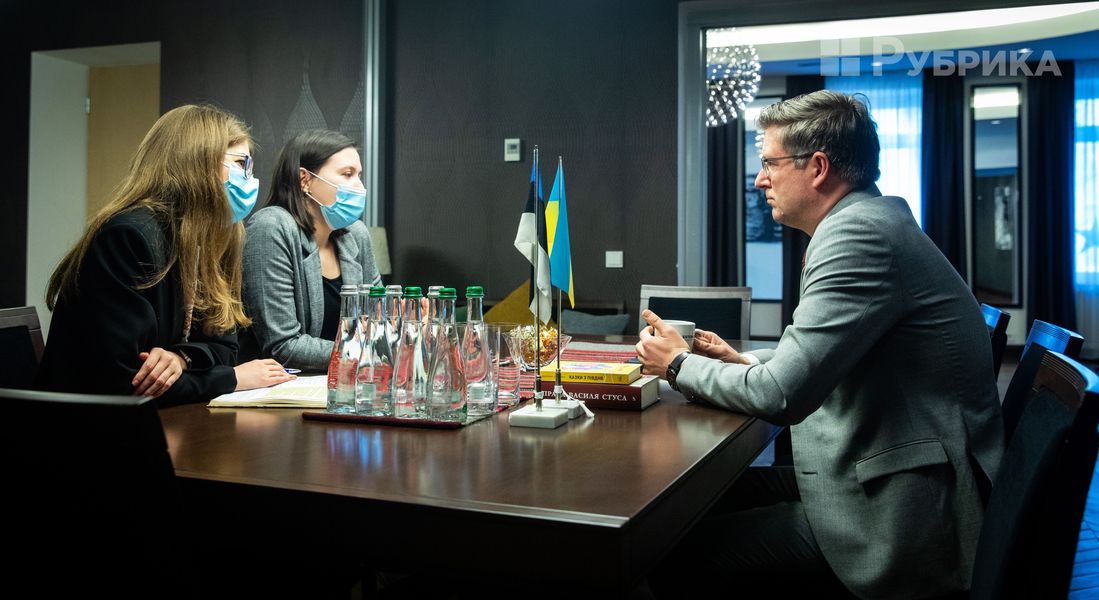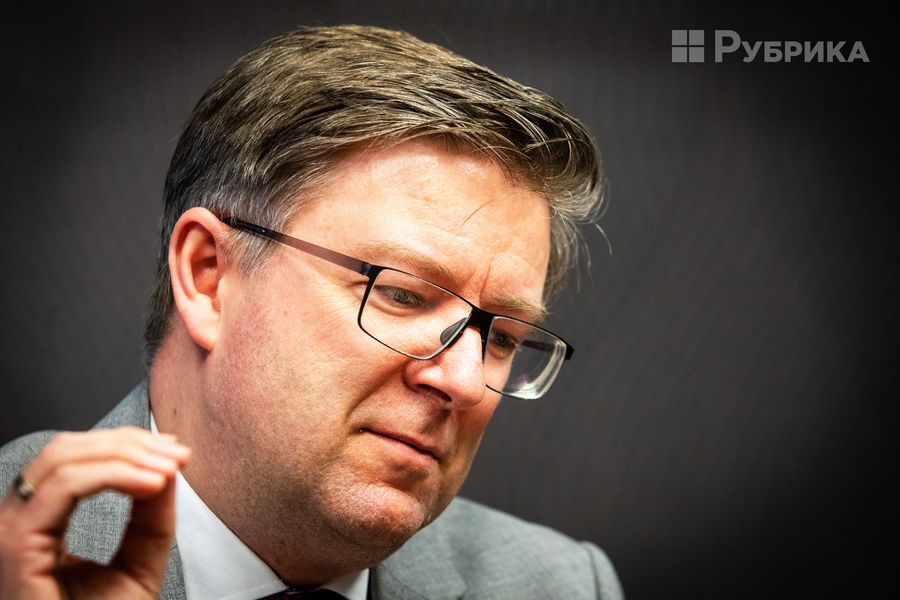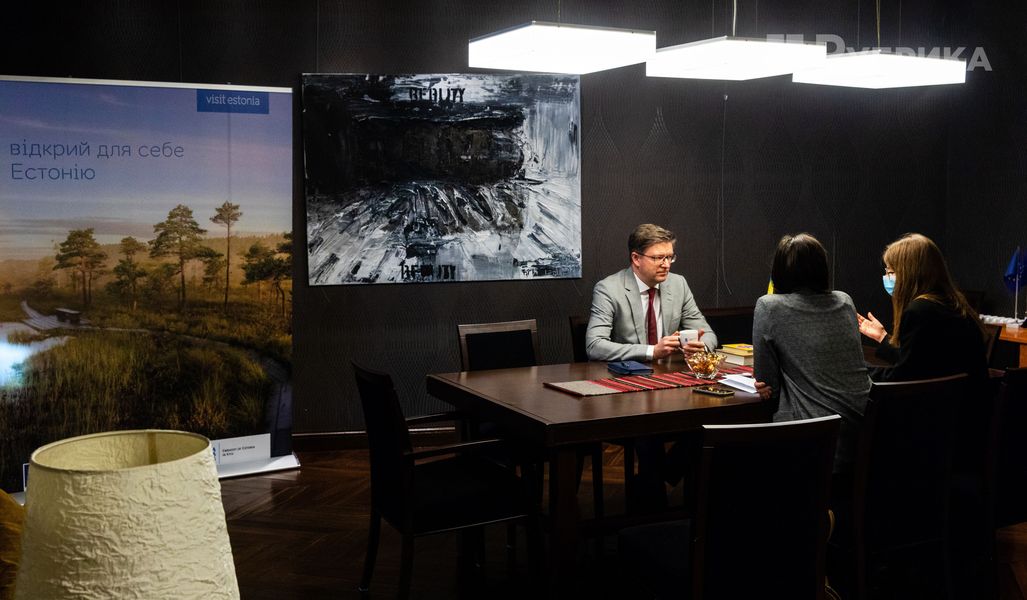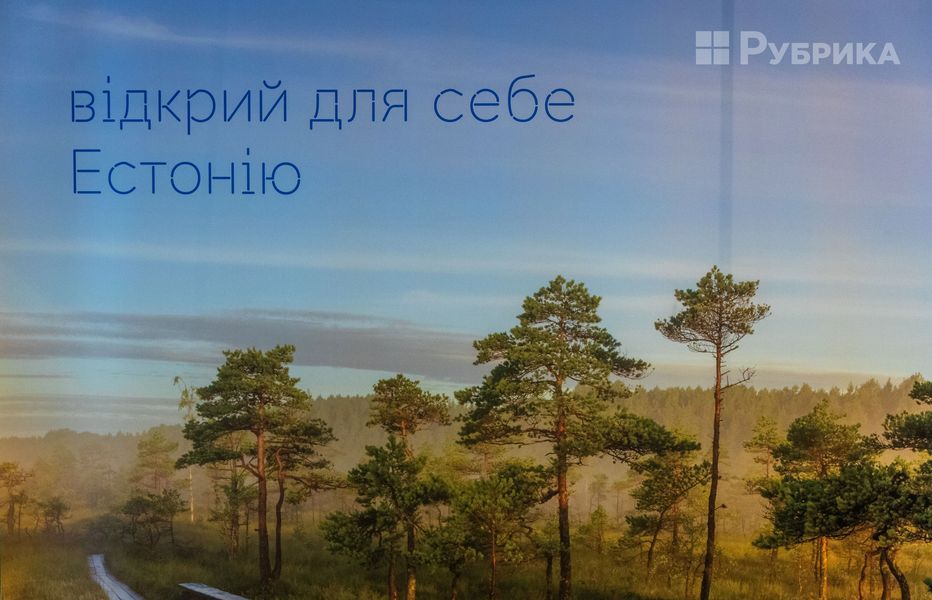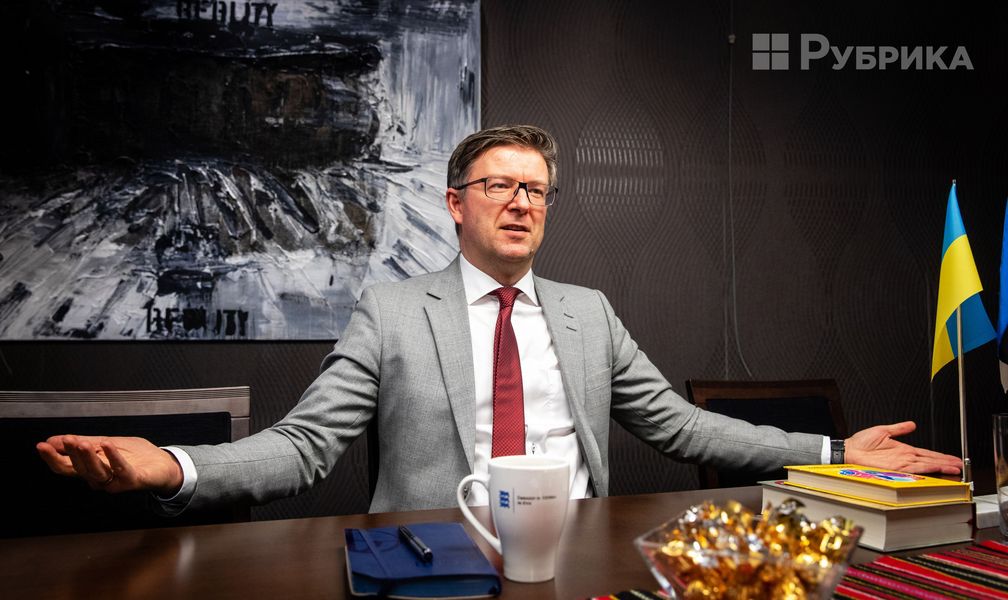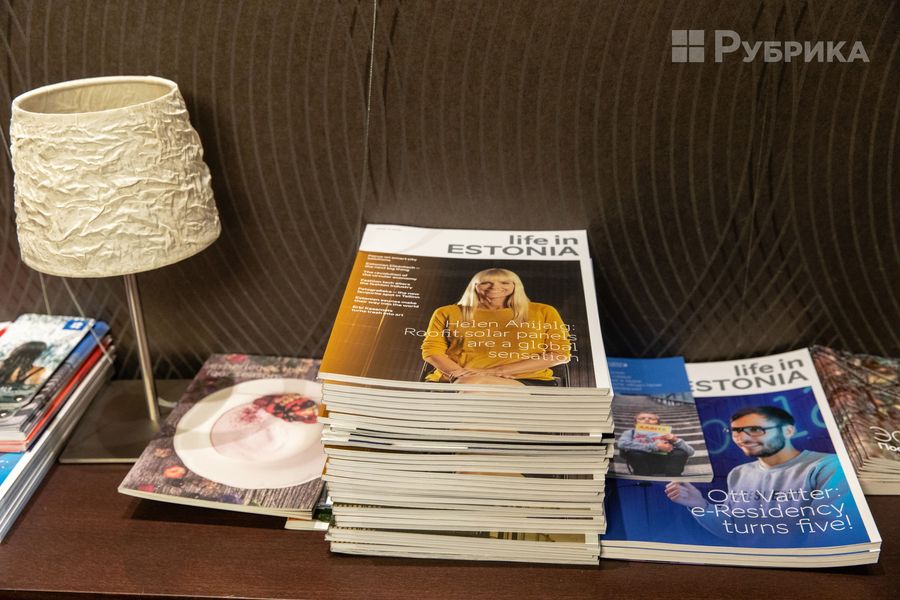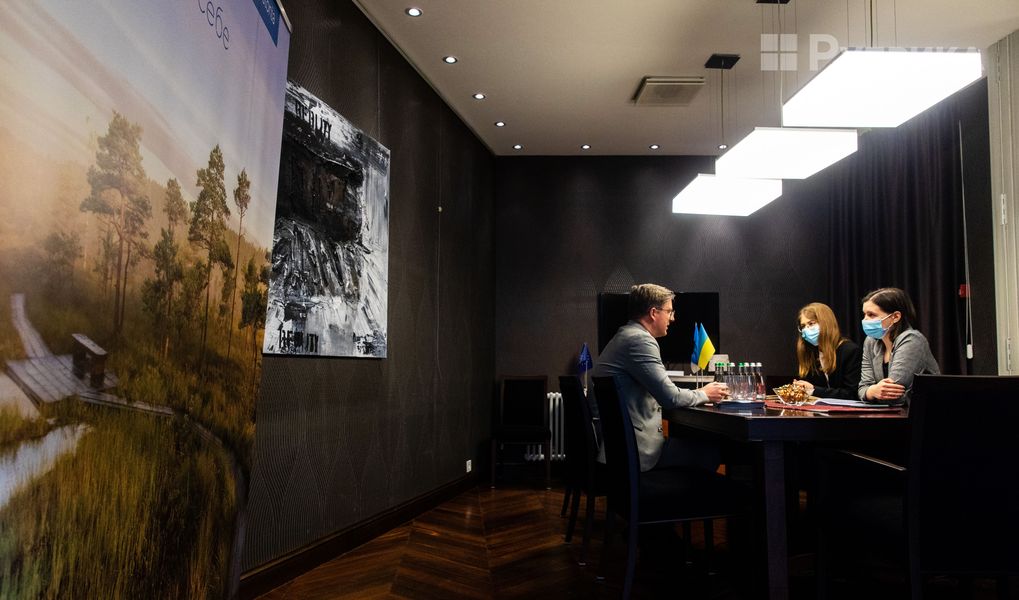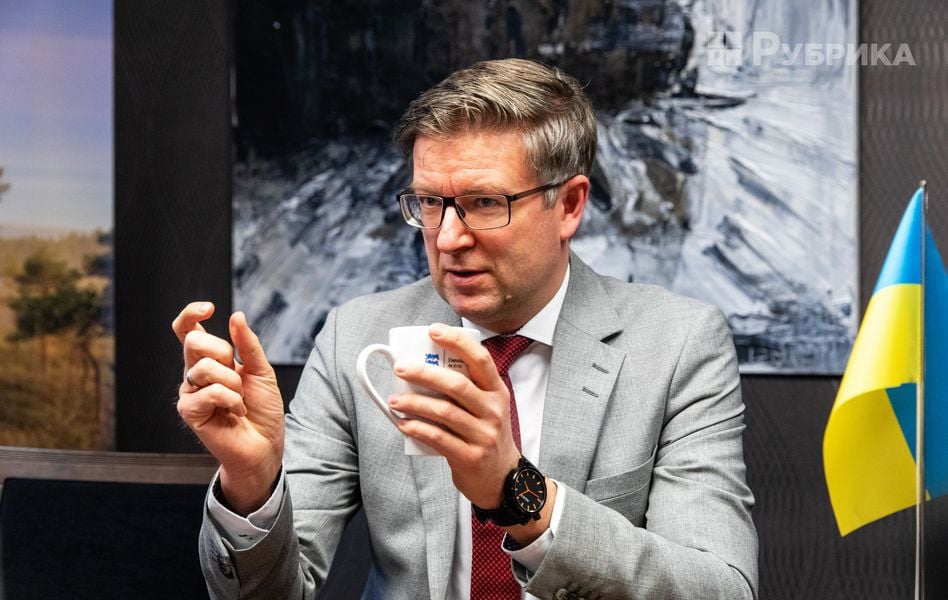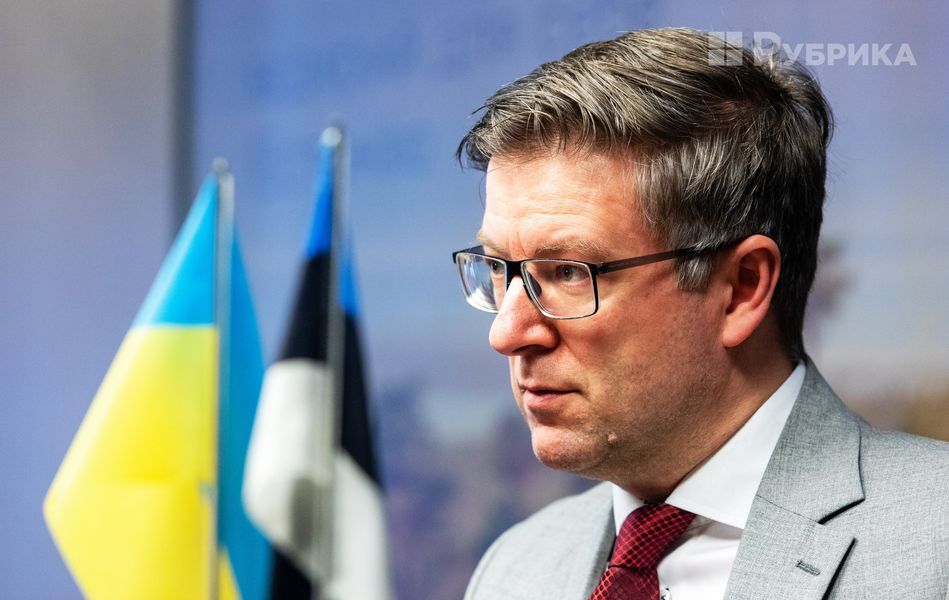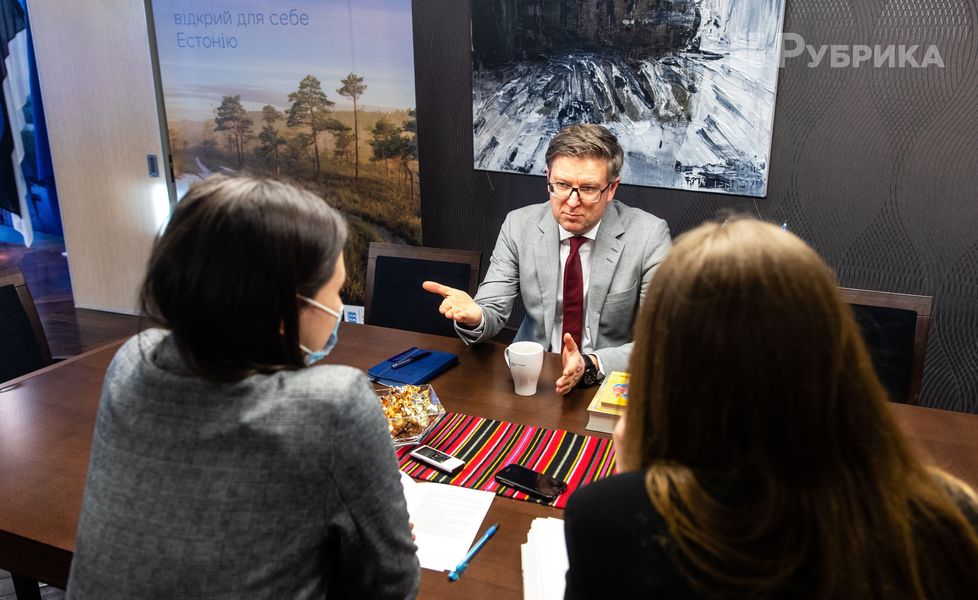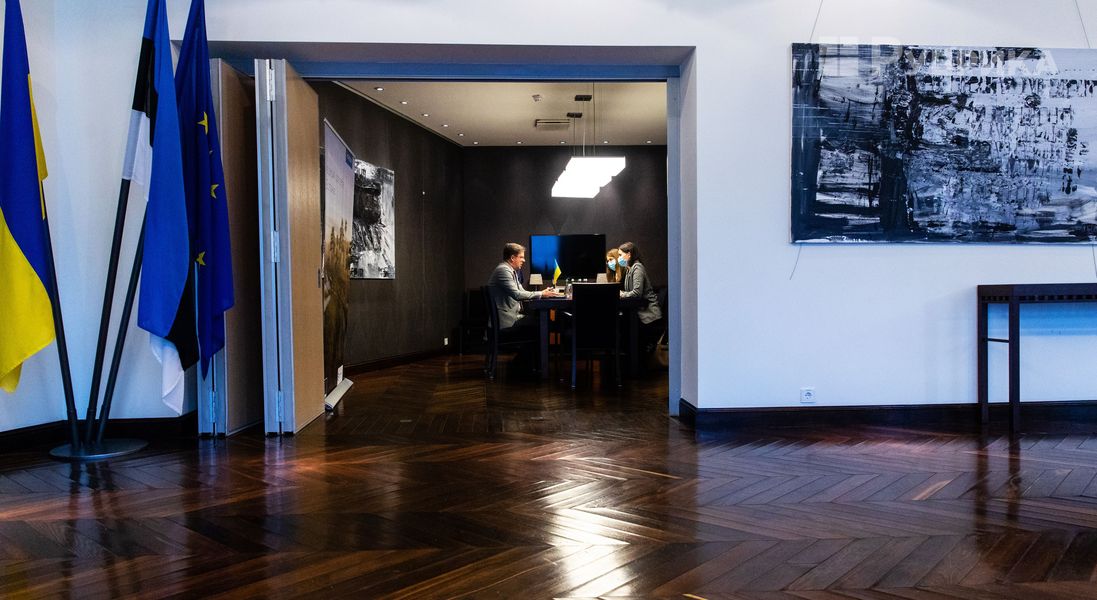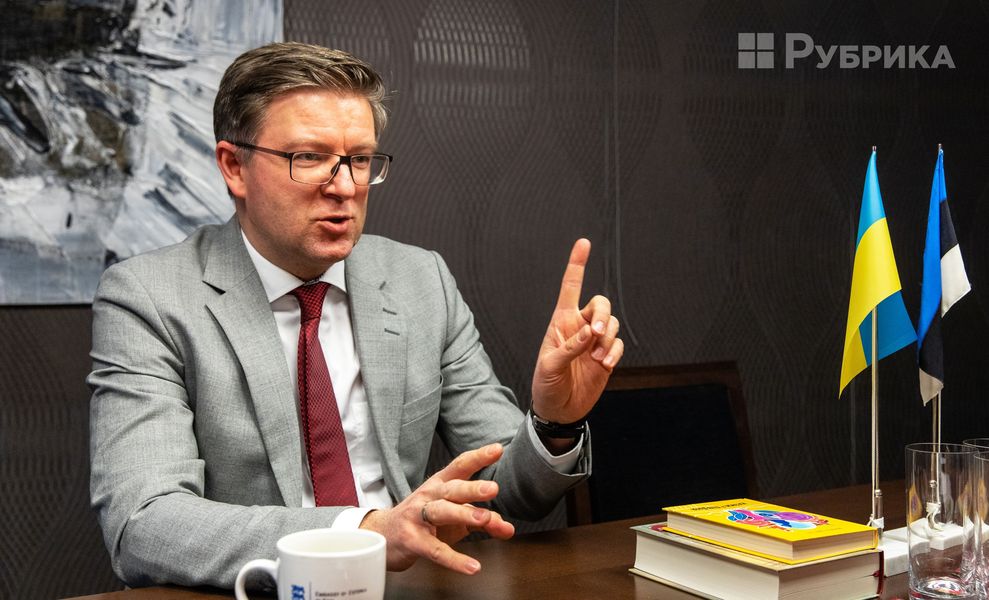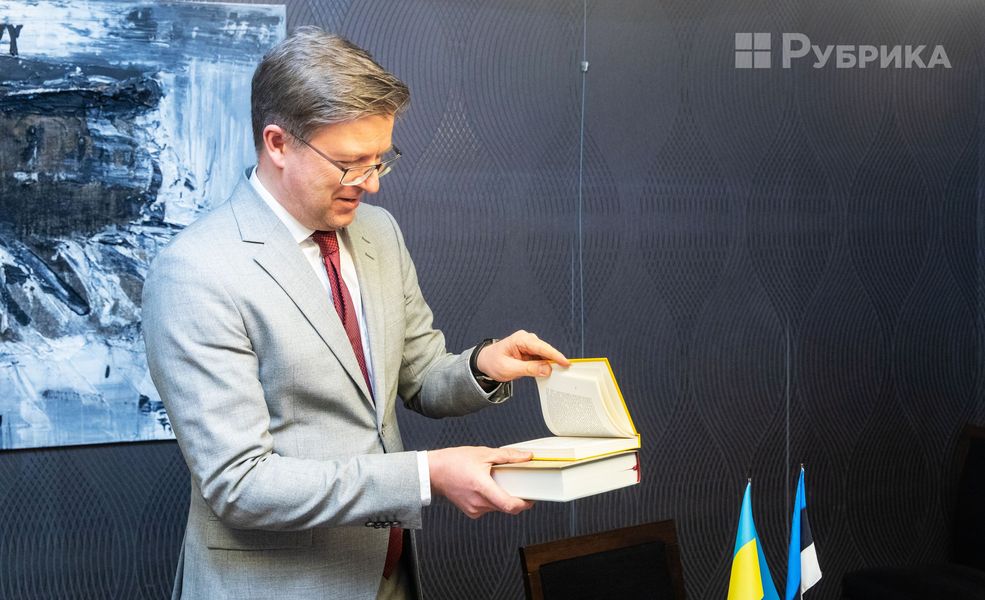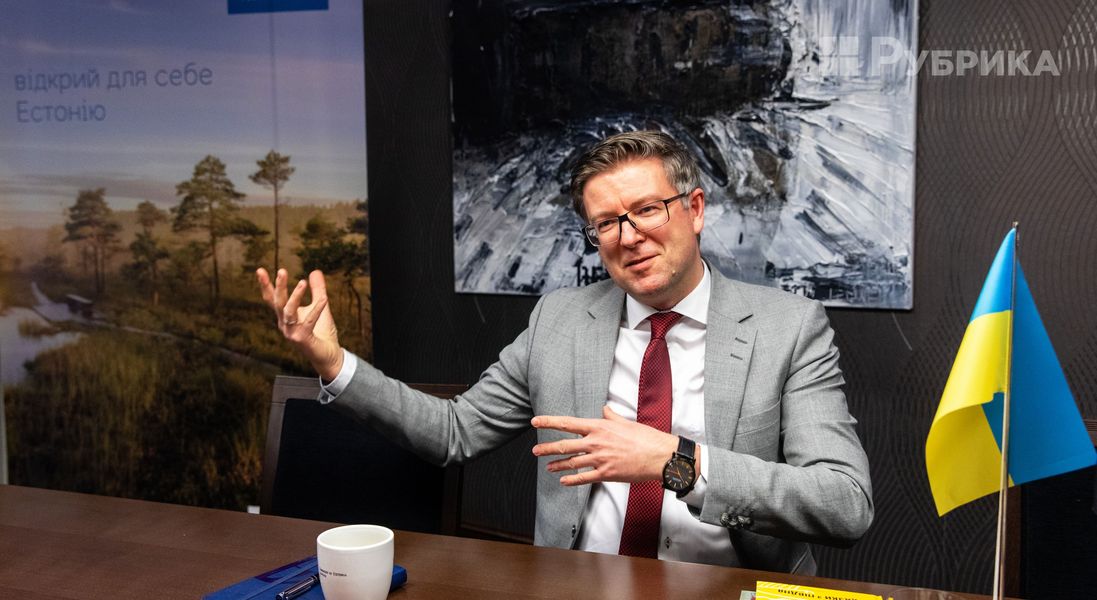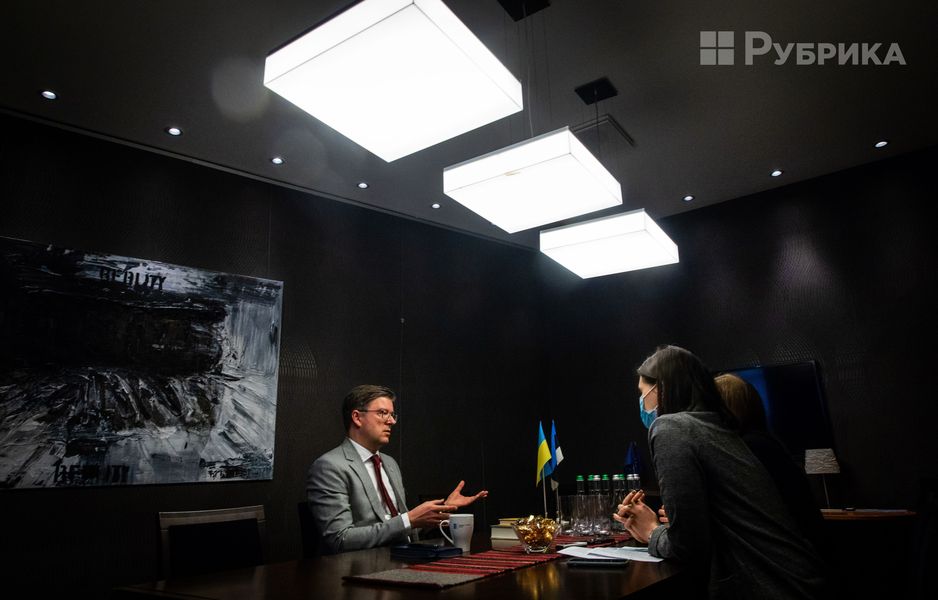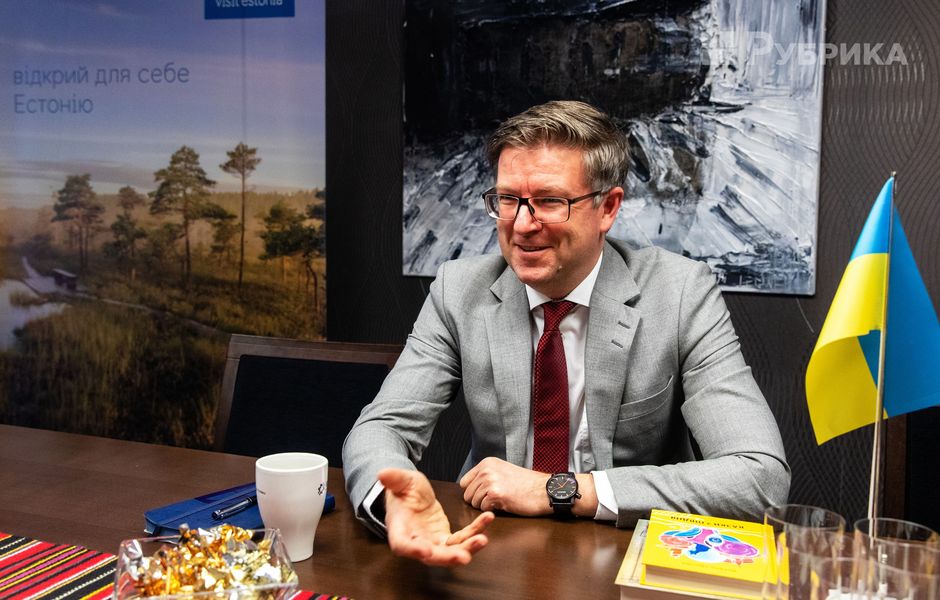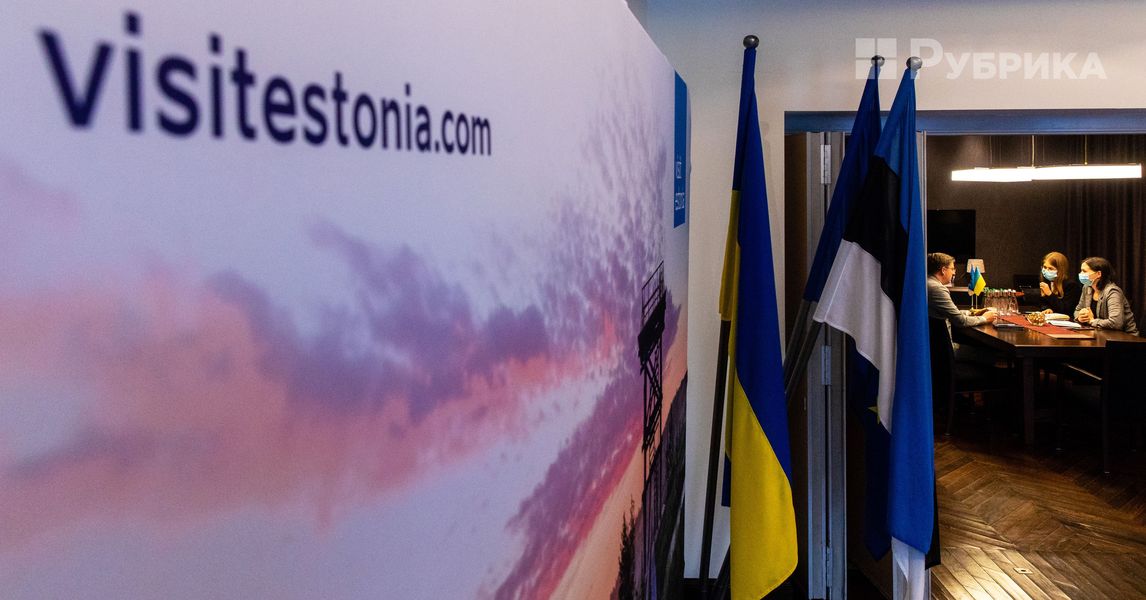"If not for Russia, we would be together with Ukraine in the EU". Interview with Estonian Ambassador Kaimo Kuusk
On the Estonian-Ukrainian relationship, Russian aggression, and Ukraine’s prospects
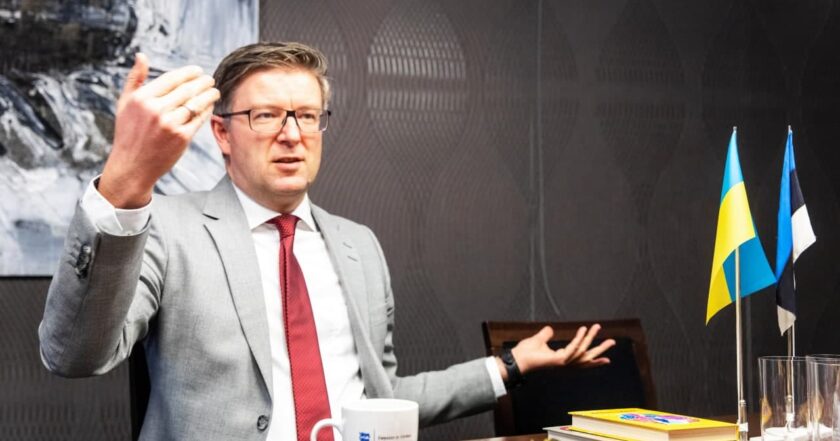
Photo: Rubryka
This interview is special for Rubryka. With it, we return to our Diplomatic Note Project, where we talk to foreign ambassadors to Ukraine about our relations, Ukrainian prospects, and international policy. Follow the announcements!
What do we know about the relations between Ukraine and Estonia? Estonia supports Ukrainians in the war against Russia, serves as an example and a source of inspiration for Ukraine in the issues of digitalization and e-state development. Besides, it's also one of the largest directions for the labor migration of Ukrainians. But that's not the entire story. Estonia is also inspired by Ukraine and Ukrainians. How? We asked the Ambassador of the Republic of Estonia to Ukraine, Kaimo Kuusk.
– You've said once that Ukraine is a number one foreign policy priority for Estonia. Why is that and is that still so?
– It is, and it will continue to be so because Ukraine is a very important country in the region, in the security and economic means, but also the cultural means. By culture, I mean mostly the culture of politics and relations between countries and people. Ukraine is a democratic country, and this is really important for us. Having such a friend as Ukraine in the region is very, very important for Estonia.
– Following this question, we know that you have studied Russian geopolitics after the Cold war. How do you think it affects our relationships and is it safe to say that we are also so close and friendly because of the Russian factor, that it brings us closer?
– Geography will not change. It happens to be with neighbors that you cannot choose them. Maybe in the 90s, there was a hope that Russia will be more democratic, but at the moment it's gone.
When it comes to authoritarian states, changes come suddenly. We tend to think that authoritarian states are stable, but actually, they aren't. For some period, yes, but not for long. So geography is not changing. I think if there weren't this Russian factor, we would be together with Ukraine in the EU. Happy. So I think it's definitely not only the Russian factor that makes us friendly countries. As I have said, we actually share a lot more.
– Maybe you'd like to share what, in your opinion, it should take for Russia to change its politics, become more democratic, shake Putin off?
– Well, it's a little bit more than just one person in the leadership. It is about the way of living and the culture, such as the culture of corruption. Which is trying to spread through the borders actually. That is why we are vulnerable in Estonia too. We are bordering Russia, the culture of corruption is always trying to spread to our side of the border as well. As a democratic country, what Estonia can do about it is to remain so, to stay democratic.
– Ukraine has openly declared its course towards EU-integration, however, there are no major developments in this field since the Free Trade Agreement was signed. Is it only connected to internal problems of Ukraine, such as corruption, war, etc.? Or maybe the EU wouldn't even consider further enlargement in current circumstances due to its internal crisis or its own reasons?
– First of all, I don't think that the EU is in crisis. The EU, I think, has the ability to cope with crises very well. It takes time, sometimes the slowness of the EU is dissatisfying, but at the end of the day, we can manage things.
If we are talking about Ukraine, you have Free Trade Agreement, and the Association Agreement, you have visa freedom, which I think is a huge thing and is beneficial to both sides. It's not like just Ukrainians are going abroad. We like you traveling to Europe. But we also love to travel here. My good friend Ambassador of the European Union in Ukraine, Matti Maasikas, just a week ago, gave an interview to Estonian radio. There was a question about Ukraine's reforms, and he said that during the last few years, Ukraine has done more reforms than in the previous twenty years. So I think you are making very good steps. And at the moment, it's very important that Ukraine will use those possibilities that the Association Agreement gives to the maximum. I just saw some interesting statistics about some goods that Ukraine can export to the EU: the quota was full already at the end of January. I would like to see the EU give you bigger quotas because I think it's more reasonable than giving just money. Thus, we learned actually that your goods are so needed in Europe that within one month, the quotas are full; it's a good sign.
So take a maximum effort to use all those possibilities that are already available, and then we will take the next step forward. I think that in the coming weeks, there will be some news which would be good for Europe and Ukraine as well.
– What do you think, by the way: if the EU eventually takes Ukraine in, what would Ukraine be for the EU – more like a political asset or economic asset?
– Well, I think Ukraine will become a member of the EU one day. It will take time. It also took us time. From the moment we really thought that we wanted to be in, we started to reform ourselves and when we realized that we were doing those reforms for ourselves, not for Brussels or Washington, it started to work for us. So it is like in school if someone tells you, 'Hey, learn this math because you have to,' well, you don't get too enthusiastic. But if you really understand that you need this math; you need to study, not cheat… Oh well, maybe cheat a little bit… (laughs), then it will make sense and it will work after all.
– How many years do you think it could take us?
– My time here as an ambassador of Estonia is 4 years max, so I can easily say 5 years and then go back to Estonia and you wouldn't be able to confront me with that (laughs). Yeah… But I'd actually say it's a decade, ten years. Time flies, you know. I want to say to Ukrainians: use this time. Reform yourself, do the homework, so then European citizens and leaders somewhere in Spain, France, or Nordic countries will ask their colleagues: "Hey, why isn't Ukraine already a member?"
– Recently, the discussion that Ukraine needs NATO has intensified, Zelenskyi's rhetorical question addressed to Biden "Why is Ukraine still not in NATO?" quickly became viral in Ukraine. In your opinion, and relying on the experience of Estonia, what depends and does not depend on Ukraine here, why are we so slow in the process, what are the chances we succeed in our NATO aspirations shortly?
– What I have already said but will repeat: what Estonia is doing is that we share our experience, we cannot teach you. We cannot say 'do exactly how we did.' Because the situation is a little bit different. Well, maybe a little more different than a little bit. One thing is that you have to decide. And I think now Ukraine has decided, at least since 2014. Sad but true – the war has made you face this big question of whether you want to be West or East. If you have decided, stick to that decision. The majority of the political forces should stick to that decision. No organization wants to have a feeling that one day their members think one way and the other day they can change their decision. It's a trouble maker inside. I think you have decided upon NATO now strongly. And now it is the time to work, to reform. Again, there is this reform talk to reform your defense forces to be able to cooperate closely with NATO countries, reform your procurement chain to get as much as possible corruption off the plate. Corruption is a wicked problem as you know, it's everywhere. Back in Tallinn, our government resigned just because of the corruption case. I can only say that our institutions are doing a great job if they can bring high-level corruption to the court. So do your homework. We are learning from your defense forces. We are training them, but we are also learning from them as well. You will become a NATO member–that has been also said by the General Secretary of NATO–all the doors will stay open for Ukraine.
– But why do you think NATO would want us? Let's say we have sorted out all our problems with corruption and other issues, but we are still at war, we are still in horrible relations with Russia. Why would NATO want that?
– But you didn't start this war. It was Russia. You do everything to stabilize your country, to defend yourself. The same is the logic of NATO. The NATO territory has been a territory of peace and prosperity for over 70 years. No one has attacked NATO successfully. So democratic Ukraine with the defense forces you are now building is an absolutely great contribution to NATO peace and stability territory. If we can enlarge that thing, this is a very important matter. That's why I think we will welcome you to the club.
– Following this theme of Russia being aggressive, how did the occupation of Crimea and the following war in Donbas were perceived in Estonia? Did those events make Estonia take some additional measures in terms of security and/or international relationships?
– It was a shock because no one actually believed that there could be a war. That was really shocking for many Estonians, not only Ukrainians. And we definitely needed to act quickly. We have built our defense forces in Estonia step by step but also steadily into nice compact lethal defense forces. So we can defend ourselves until other NATO allies arrive to help us. But since Russia is just bordering us, there's a very small early-warning time. So the US has brought some fighter and attack planes quickly to Estonia in 2014, and now we have a UK battalion as well. We are good at cyber; we have good security and intelligence services, and good defense forces which are participating in military missions in different places in the world. But we lack, as I like to say, some heavy metal (laughs, does the sign of the horns, a universal symbol of heavy metal music). That means that we lack heavy armor and planes, but that is what the other allies can give us. And don't forget that NATO is a nuclear alliance, so we belong to a nuclear alliance, and that is really important in the matter of deterrence to avoid even thought of attacking us.
– We'll come back to cybersecurity later but for now let me ask you this question: here in Ukraine, the Russian language is at the root of many polarizing debates. What has Estonia done to prevent such polarization and manipulations?
– We have had huge debates and huge discussions and quite big tensions. I don't see that tensions in Ukraine have reached the level that we have had in Estonia. It's far from that. You are a very calm country in that matter. The logic in our case is that there are 1 million people in the world who speak the Estonian language. Estonians can't go to some other country and speak Estonian. So we have to defend our language. And it's very logical that wherever you are in Estonia, be it on island Saaremaa in the West, or in the East, in Narva, if Estonian go to a shop and want to be serviced in the Estonian language, it should happen. I think it's not very much to ask. That's the logic of our Estonian language development and teaching it to other nationalities in Estonia as well. We are not prescribing them how they should communicate with each other. If the Ukrainian is sitting there as a shopkeeper, and another Ukrainian is entering this shop in Tallinn or the Ukrainian cultural center there, let them speak Ukrainian! But if my daughter enters the shop and wants to buy this beautiful handcrafted thing… After 4 years in Ukraine, she can probably ask it in Ukrainian. But if not, I believe it should be a local language that the service should be given in.
Language is one of the most emotional topics. It's the same with belief matters. And all the arguments are not worthy in the case of beliefs. You should stay very calm and continue to explain and explain and explain that we are not discriminating against anyone.
– How many years did it take for Estonia to solve this problem? Is it solved now, really?
– No. No (smiles). It still continues. We still have a lot of those discussions; for example, how many subjects should be taught in the Estonian language in Russian schools in Estonia. What should a percentage be… Even though Russian speakers who know the Estonian language are better in the labor market because Estonians don't learn Russian anymore as much as we had to. But these arguments are not working in emotional moments. However, we have been able to calm down this situation.
– Speaking about the labor market, In 2019, 75% of international workers came to Estonia from Ukraine. How do they affect the Estonian economy and society? Are there any thoughts that such temp of migration might be unwanted?
– I think Ukrainians have helped Estonia very much. Let me describe the logic. It's a very human and normal way of living and how societies are functioning. For years, at least since we got our independence back, and the borders were open, thousands of Estonians have been going to work in Finland. Because there are higher salaries. Finns go to work in Sweden. Swedes go to work in Norway. Because there are higher salaries than in Sweden. I don't understand where the Norwegians go to work (laughs). If Estonians are going to work in Finland, we need someone.
My relative, a good young doctor, worked in Saaremaa in spring. When the Covid outbreak was there, he got infected there and got the Covid treated. And in summer, he decided that he wants to work as a doctor in Finland. At least for some time to get a different experience. Should we close the border and say: no, Estonians should work only in Estonia? No. That's why we are in the EU. We want free movement of the people. So he now works in Finland.
My mother's family doctor recently retired. Who's the new one? A young Ukrainian. Really good. Has learned Estonian. So I think it's a very natural functioning of society. The Ukrainians who come to Estonia to work are also highly motivated to learn the language quickly. So welcome.
– Do you think Covid has changed this process with migration between Ukraine and Estonia entirely and for a long time? Because in the EU, it's easier, really. But with the borders closed…
– Well, it's difficult also in the EU. Nation-states, first, are taking care of their own citizens, and the borders have been closed. Poland, Lithuania, and Germany closed the borders recently for some neighbors for some period at least. Certainly, it has affected traveling and living in Estonia. I just checked that in 2019, we gave out 6700 long-term visas for studying, living, and working in Estonia. And last year, the year of Covid, we gave out 2 times less, 3900 or something similar to that. So as you see, it has definitely affected traveling.
On plans for 2021
– Let's move on to the bright future…
– It will come (smiles).
– What plans does the Embassy have for 2021 in Ukraine? What are the most important tasks and planned activities?
– 2020 has definitely been somehow limiting with its possibilities. We lacked high-level visits, for example. The last high-level visit was when the head of Rada Razumkov went to Estonia exactly a year ago on the 25th of February. 24th is an Estonian Day of Independence, and on the 25th, official visits started in Tallinn. After that, no high-level visits. So we are starving for high-level visits. Today there was a phone call between Kuleba and our new foreign minister Liimets, and they definitely invited each other to visit. We hope that this summer, from June, we can resume high-level visits.
The covid year has also limited our ability to travel here. But I hope that I could travel more to regions here as well.
Projects. What we definitely want to push forward is an electronic border crossing system we have functioning in Estonia and would like to bring it to Ukraine as well. And I hope that this year we will be able to do that together.
So there are different things we are hoping that we will be able to restart and push forward in a more active way.
On investments in Ukraine
– Ukraine has been making a point out of its readiness to attract foreign investments and help the investors out along the way. Do you think Ukraine might be an interesting option for Estonian investors? What spheres in particular?
– Definitely one of the most interesting spheres for us is the IT sector. One project that was frozen because of the Covid was a digital sandbox between Estonia and Ukraine. IT entrepreneurs look at Ukrainian direction, and Ukrainians also are looking at Estonian direction because maybe it's easier to make business in Estonia for them. I had an entrepreneur here only a week ago. He came here and said, hey, we haven't met before, but he wanted to pay a visit and said that he's thinking about a massive investment in Ukraine. So he asked me: what do you think, is it safe for my money? Is there a rule of law, can we trust the court systems and those kinds of things? So you see there are worries: if someone invests money here, is it safe? I said to him that I think that things are going in the right direction, and we as an Embassy are ready to support our entrepreneurs. And that Estonia as a state is keeping an eye on them and wishes that they are successful. So there is more and more interest, but definitely, there are also some cautious attitudes.
– Do you think we should be more articulate and loud about how successful we are in our progress with these things that worry people usually?
– Potentially yes. I think it is really important what the EU has said that the Ukrainian court system should be reformed so you can go to court and be sure that the decision will be neutral to both sides.
There are successful Estonian companies as well in Ukraine that do the business and get the profit and help Ukrainians get good salaries.
– For example, which ones?
– Really, really a good company I like to highlight is the ELME MESSER GAAS. It is producing gas for the industry, metallurgic industry, for example. But they also produce medical oxygen. What at the moment is needed so much at the hospitals. They are one of the biggest producers of medical oxygen in Ukraine.
On cybersecurity and digitalization
– Here is an important question. Recently, cybersecurity has become a reason for uncertainty when it comes to digitalization. Is it possible to make a state's digital services completely safe? What risks and threats arise for the state when it comes to digitalization?
– Estonia is actually cooperating closely with the Ukrainian ministry of digitalization. And Estonian companies – one of them is called 'E-government academy' which is actually a company, not an academy – cooperate really closely, and they help to make those systems that are developed at the moment secure as well. We in Estonia realize that we need these electronic solutions. We don't have so many people that we can put to sit in the offices and wait for the people to come. So we decided that we need to make those services electronic. We started it almost 20 years ago. And it wasn't easy at the beginning to convince people that it would be a success story and a great thing. There were many skeptical people. But you have to have one visionary and supporting team, and we had it.
Our ID card first was just like a plastic card with a metal chip and a picture. It was a document you could use as a substitute for a passport. We made it compulsory, so you have to have an ID card, but you can have a passport. And within the EU, you can travel using an ID card. So you don't need a passport. Coming to Ukraine, yes, at the moment you need the passport.
When the services started to accumulate, we introduced electronic voting. We made it secure and I will guarantee it's more secure than paper voting. Because you can check it, you own your vote. You can check what has happened to your vote. When you have put the mark on a paper, it then goes I don't know where. Well, in a democratic country, it goes to a nice place, but nevertheless. So we upgraded our systems before the e-voting and that actually saved us also during the Russian cyberattack in 2007 because just a few months before, we had elections, our electronic systems were up to date, the most secure. If we haven't done that, our systems could have collapsed for weeks. In reality, it took less than 24 hours. You have to invest in this electronic security constantly.
In Estonia, we also say that there is never too much love and never too much security (laughs), so to deal with those issues above is the way forward. We economize by just electronic signature 2% of GDP in Estonia. Me not taking my papers, going to the bank, standing in a queue, then going to the tax registration office, I can do it all from my office, from home, with my morning coffee, within minutes. I don't waste my time, car fuel, etc. And 2% of GDP is the Estonian defense budget, basically.
– Do you think that the same thing should work in Ukraine, because in Estonia, as you've said this was partially a solution to the lack of people, and in Ukraine, many people are working in this sphere, and 100%, there will be so much lamenting about people losing their jobs…
– In our case, these electronic solutions created new jobs. Different sphere, but still. You have a lack of IT guys as well. Of course, you cannot reeducate all of them into IT, but that's not an argument. And in Ukraine, as I have already said, you have a huge country. The distances are crazy. For 11 hours we drove to Zakarpattia, from Kyiv, from the center of Ukraine. It takes 8 or 9 hours to get from Kyiv to Severodonetsk. So it's 20 hours! Can you imagine now if you have to send some papers, signed papers from Severodonetsk to Zakarpattia? Better do it electronically, and it's the speed of light that brings your signature to Zakarpattia. It is needed here, I think. That's the future. And I believe you can get it implemented. And we already get inspired by your solutions. Because your platform is new. You are using smartphones. When we started, we used PCs and Macs. Everybody now has a smartphone. Not everybody has a PC at home. All those programs we have created are for the PC and the PC screen cannot fit the smartphone. That's why our IT guys are interested in cooperating with Ukraine. To learn from you and get this energy kick to make our own things even better.
– Do you think it's going to take a long time for Ukraine to reach a point when this whole thing works properly and securely?
– As strange as it can be, the Covid has helped it. A week ago I was together with Fedorov at the conference panel, and he said that your use of e-solutions during the Covid time has raised 5 times.
Once my mom voted electronically before I did it. I wanted to go to the poll station as a political science student; I was excited to do my paper vote (smiles). And she said she didn't want to go, the election day in Estonia is in March, it was cold… Well, I have more things to do, she said. Of course, I voted, I already did it actually. I did it electronically.
So if people feel that they can economize money and time, they will switch to it. But in our case to make the ID card compulsory helped us. In Finland, they didn't make their ID cards compulsory. And I think only around half of the population still has it. In Estonia we have a nice saying – if you have a thing and it doesn't ask for bread, let it be (laughs). But if you have a thing already you can check, maybe you can do something with that. 99.5% of public services in Estonia are electronic.
– Do you have some other Estonian tips to make this whole thing work except for making it compulsory?
– If the solutions are functioning well and really have started to spread, then you cannot stop it anymore. Because the people who have used it feel satisfied. Talk to them. Get the feedback. Try to make things even better.
Include all sorts of private companies. We included banks. Because banks were also very interested in those – they didn't want to keep their offices in small towns. Banks are also worried about their money, so the platforms should be secure. They helped us and cooperated with us. So include the private sector as well. That's important.
On favorite books, travel plans, and football
– Our readers love books and reading. What would you recommend them to read and what are your favorite books?
– That's a nice question because I love reading myself. But now, it depends on what you want this reading to be for.
First of all, at the moment I suggest reading the freshest yearbook of the Estonian Foreign Intelligence Service. As we say in Estonia, there are two books that are mostly anticipated annually. One of them is the Foreign Intelligence service book, and the other is the Internal Security Service yearbook. You can read it in Estonian and English, and on the Internet as well, though paperback is definitely better.
If you are thinking of a book that can help you in work, I can suggest you a read for improving your leadership skills: my favorite author is Jim Collins. And his book 'How the Mighty Fall.' That's my favorite.
Another really good book I just got as a Christmas gift from my colleague is 'Tipping Point' by Malcolm Gladwell. It's about how trends are started and what is needed for a trend to be started. That was an inspiring book.
I would also recommend some books which are not so much work-related. I need to read so much during the daytime anyway, so on weekends, I like to read something entertaining. I like fantasy and science fiction. My favorite international author is Neil Gaiman. His book 'Neverwhere' is really, really good. Or 'American Gods,' for example.
There is also an Estonian-rooted author living in the US, not very much known. Kirsten Bakis and her book 'Lives of the Monster Dogs. It's a really interesting mixture; it gives you the feeling of a February afternoon sun, which is bright but cold at the same time. Gives you that bittersweet moment from the story. Little sadness and brightness as well.
– What do you think Estonians and Ukrainians have in common? What are the main differences?
– Definitely, we share the love for freedom and independence. This is what we both have in common. That's why you are democratic, and we are democratic, I think.
We both like singing. Maybe on different occasions (laughs).
We are very fond of our Song festivals, which I hope when the pandemic is over, we will be able to resume.
And about the differences…
We are more individualistic, I think, in Estonia. The dream of an Estonian is to have their own house and their closest neighbor far and close enough: when you can see the smoke coming up from the chimney somewhere behind the horizon.
Here I think you are more collective. You love company more.
I have an interesting story (laughs). One foreigner once described Estonians like this: You are like birds. You look at each other, not saying anything, but understanding everything.
I'm a mixture. My grandfather was Ukrainian from the Vinnytsia region. So I have some roots here as well. So what Estonia and Ukraine have in common is me. (Laughs)
– You've mentioned that you would like to visit more regions in Ukraine. Which in particular?
– I managed to travel not much at all. I would like to go and see the Sea of Azov. I have never done it. I've been to Odesa, but not as an Ambassador. I would like to travel to different parts of Ukraine. Because I feel that those differences are making you rich. It's a huge country. Amazingly huge, compared to Estonia (smiles).
In the West, years ago I went to Lviv but not as an Ambassador. I have not been in more than half of the regions, in Kherson, for example. But I have promised Anton Korinevych, the president's representative to Crimea that I will go there and I will bring our president and prime minister along.
– As far as we know, you are a football player. What do you think about Ukrainian football? Do you have a favorite team or a player?
– You have a really, really good football. I miss the possibilities to go and watch games at the stadium. When I arrived, I managed to go and see some games. It was funny: when I left Tallinn, my colleagues gave me as a gift a shirt of Donetsk Shakhtar. When my brother came here and we watched the game of Kyiv Dynamo vs. Donetsk Shakhtar, he bought a shirt of Kyiv Dynamo. (Laughs)
As a diplomat, I cannot say that I have chosen the side. The greatest player in my opinion in Ukraine is Andriy Shevchenko. I have a ball with his signature. I'm very proud of it.
Photo: Rubryka




